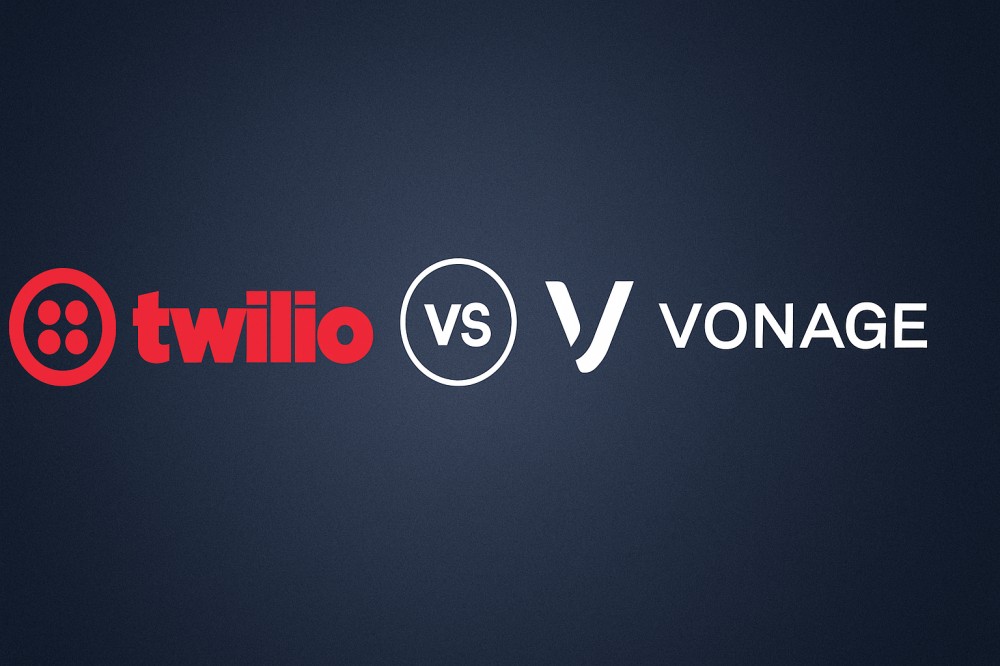The value of effective communication tools increases as companies go online and reach customers around the world. At this point, choosing the right platform impacts cost, performance, and customer experience. Many companies explore Twilio vs Vonage to find the best solution for messaging, calls, and integrations. So, this guide compares their offerings in detail and also introduces a powerful platform as a modern alternative.
Twilio vs Vonage: A Quick Comparison
You should first understand about these communication platforms is their similarities and differences. Therefore, in this part of the Twilio vs Vonage comparison, you can determine the best choice that fits your needs:
| Feature/Aspect | Twilio | Vonage |
|---|---|---|
| Overview | Highly customizable APIs for developers to build SMS, voice, and video features. | Easy unified communication setup for voice, SMS, video, and IP-PBX with powerful APIs. |
| Target Segment | Startups to enterprises need custom solutions. | Powerful, scalable solutions for businesses of all sizes. |
| SMS/Messaging | Global reach (180+ countries), granular control, advanced analytics. | Wider reach (200+ countries), competitive rates, omnichannel API. |
| Voice | Advanced call control, IVR, AI agents, programmable SIP, speech recognition. | Reliable telephony, SIP trunking, 120+ languages supported, strong call quality metrics. |
| Video | Programmable video API (WebRTC), screen sharing, background blur, and custom video rooms. | Interactive video API, easier integration for healthcare and education, and quality optimization. |
| WhatsApp Messaging | Supported. | Supported. |
| Contact Center | Twilio Flex: Fully programmable, AI/IVR support, customizable workflows. | Vonage Contact Center: Pre-built, quick deployment, strong workforce management tools. |
| Authentication API | Multi-channel (SMS, WhatsApp, voice, email), analytics, silent network authentication, PII compliance. | Multi-channel, customizable templates, dynamic code generation. |
| Integrations | Extensive third-party support, CRM, helpdesk, workflow tools, SDKs. | Integrations with IP-PBX, video conferencing, and collaborations. |
| Security/Compliance | HIPAA, SOC 2, GDPR, encryption, audit trail. | GDPR, telecom regulations, data residency, consent management. |
| Customer Support | Tiered plans: developer, production ($250+/mo), business; live chat, phone, SLAs at higher tiers. | Standard (web, email, chat); Premium 24/7 support starts at $750+/mo. |
| Market Position | 50% SMBs, 30% mid-market, 20% enterprise (G2). | 67% SMBs, 23% mid-market, 10% enterprise (G2). |
Twilio vs Vonage: Feature Comparison
Understanding features plays a key role in deciding which communication platform fits business goals effectively. Hence, the following detailed Twilio vs Vonage feature comparison highlights strengths, guiding companies toward the right decision:
Twilio Messages API
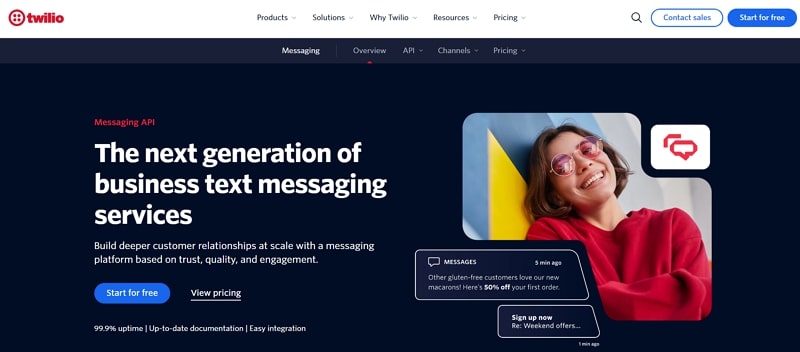
Features:
- Multiparty Conversations: Support both one-on-one and group messaging for customer interactions easily.
- Cross-Channel Messaging: Send and receive messages across SMS, MMS, chat, WhatsApp, and Facebook Messenger.
- Web and Mobile SDKs: Utilize SDKs for web and mobile to rapidly deploy chat experiences in applications.
Use Cases:
- Deliver transaction updates and fraud warnings via channels.
- Also, guide customers with product choices and checkout conversations.
- In addition, connect doctors and patients through secure conversational messaging.
Vonage Messages API
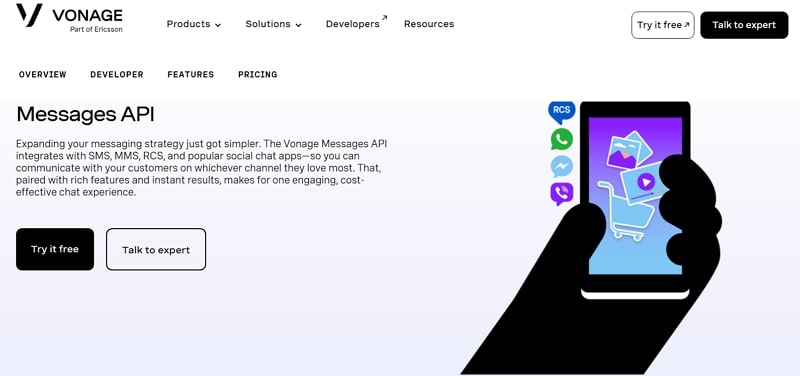
Features:
- RCS Capabilities: Facilitate the interaction of messaging with Rich Communication Services to enable a contemporary engagement.
- Multi-Channel Messaging: Besides, integrate SMS, MMS, RCS, WhatsApp, Viber, and Facebook Messenger through a single API gateway.
- Two-Factor Authentication: Integrate 2FA using SMS, voice, WhatsApp, and email channels to validate customer identities.
Use Cases:
- Send critical alerts like weather or security warnings by preferred channel.
- Also, gather feedback and run surveys using conversational messaging flows.
- In addition, empower customers to confirm or cancel appointments conversationally.
Twilio Voice API
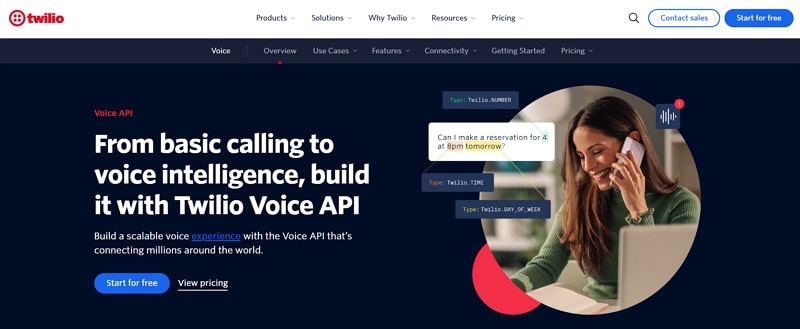
Features:
- IVR feature: Automates call routing and responses, supporting text-to-speech in hundreds of languages efficiently.
- SHAKEN/STIR Protocol: It also fights caller ID spoofing and robocalls, ensuring trustworthy and legitimate call identification.
- Voice Recording: Records to ensure compliance, quality assurance, and training with the ability to play easily.
Use Cases:
- Notify customers about order statuses and delivery updates instantly.
- Moreover, call candidates with automated job alerts and interview instructions.
- Additionally, send emergency alerts or important notifications via voice calls.
Vonage Voice API
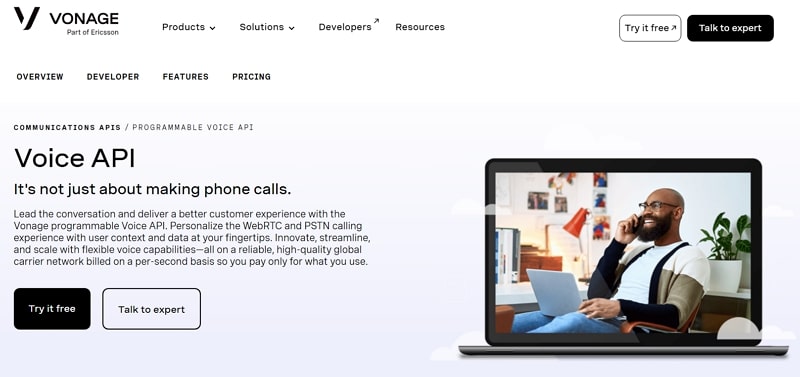
Features:
- Multichannel Recording: Allows the recording of calls on IP and PSTN channels to be used in compliance and analysis.
- Voice Quality Engine: Deliver carrier-grade, low-latency voice calls with superior audio quality.
- Voice Bot Package: Access voice bot setup and support from Vonage AI experts for quick deployment.
Use Cases:
- Support seamless click-to-call via websites and mobile apps.
- Also, integrate live call transcription for compliance and quality monitoring.
- Furthermore, authenticate users through voice biometrics for secure identity verification.
Twilio Video API
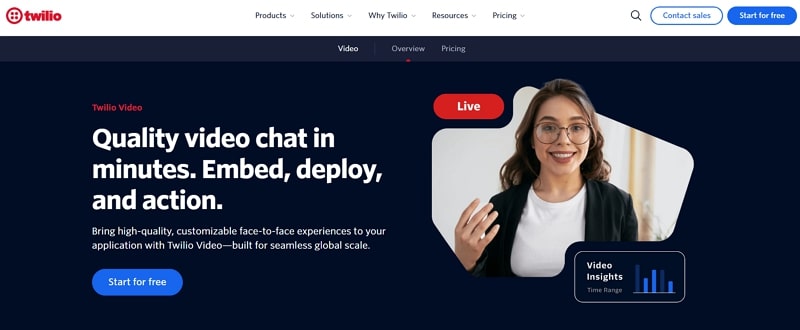
Features:
- Group Video Conferencing: Facilitates multiparty video-conferencing with instant interaction between numerous users.
- Virtual Backgrounds: Moreover, it allows virtual backgrounds to improve the visual experience and professional look in calls.
- Screen Sharing: Enables the user to share their screen content in a call to present or collaborate.
Use Cases:
- Conduct webinars and virtual events with live video streaming options.
- In addition, carry out job interviews online to allow ease in candidate vetting.
- Moreover, enable technical support with screen sharing and real-time video assistance.
Vonage Video API
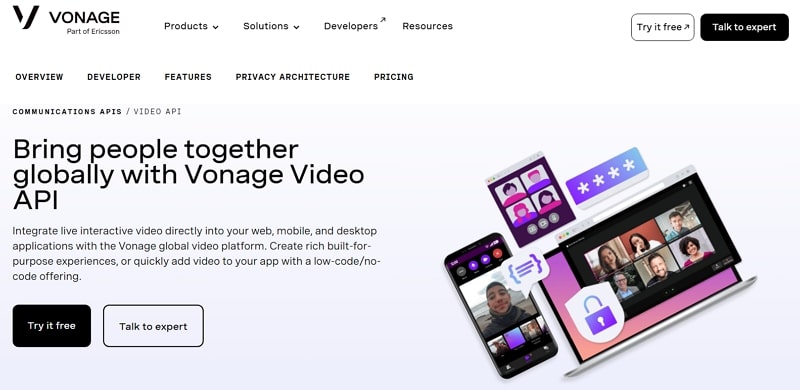
Features:
- Interactive Broadcast: Host large video event sessions of up to 16,000 participants simultaneously in real-time.
- Media Processor: Moreover, apply live video and audio effects, including blur, spotlight, surround sound, and echo cancellation.
- Video Resolution: Deliver up to 1080p FHD video quality for crisp and professional visual communication experiences.
Use Cases:
- Connect patients and doctors for remote healthcare video consultations securely.
- Besides, facilitate virtual classroom sessions and interactive online education experiences.
- Host multiparty video meetings for remote teams collaborating from anywhere.
Twilio vs Vonage Pricing Comparison
As we know, pricing plays an important role when choosing communication platforms, and comparing Twilio vs Vonage reveals meaningful differences. Below, we will discover both platforms’ pricing and compare them to choose which one is the ideal choice:
| Service / API | Twilio Pricing (2025) | Vonage Pricing (2025) |
|---|---|---|
| SMS (US) | $0.0083 per message (pay-as-you-go) | Contact Sales |
| Voice (US) | $0.0085/min receive, $0.014/min outbound | Around $0.00798/min outbound |
| Video API | $0.004/min per participant | $0.0041 per participant/min |
| Email API (SendGrid) | Free up to 100 emails/day; From $19.95/month | Included in Business Suite only |
Twilio vs Vonage: Pros and Cons
Every platform has strong points and weak sides that affect business choices differently. Thus, looking at Twilio vs Vonage pros and cons helps companies select the option that best fits their communication goals:
Twilio pros and cons
Pros
- Supports multiple channels, including SMS, voice, WhatsApp, and video APIs.
- In addition, advanced analytics offer profound data on messaging and call performance.
- Wide external integrations facilitate CRM, helpdesk, and workflow automation.
- Moreover, voice APIs have speech recognition and text-to-speech to provide interactive experiences.
Cons
- Pricing can become expensive for high-volume usage without committed contracts.
- In addition, customer support can be limited or costly at lower subscription tiers.
- Higher latency may occur in some regions depending on network conditions.
- Alongside that, UI customization options for contact center solutions require development resources.
Vonage pros and cons
Pros
- High reliability with 99.999% uptime guarantees minimal service interruptions.
- In addition, strong integrations with popular CRMs and productivity tools.
- Moreover, a comprehensive admin portal simplifies managing calls and communication features.
- Along with that, 24/7 customer support options help resolve issues promptly across tiers.
Cons
- Features can be complex to fully utilize without dedicated IT resources.
- Occasional call drops or latency issues are also reported during peak usage hours.
- The basic plan lacks some advanced call management and contact center features.
- Moreover, call quality heavily depends on stable and high-speed internet.
Twilio vs Vonage Customer Support
When comparing Twilio vs Vonage customer support, it is clear that both providers offer structured support plans. Therefore, Twilio includes free developer support, with 24/7 live chat, phone, and web support available on paid plans. Besides, they guarantee response times via SLAs, with up to one-hour responses for issues in higher-tier plans. Moreover, technical account managers are assigned for Business and Enterprise customers, focusing on API and developer support.
On the other hand, Vonage offers Standard support during business hours with web, email, and chat access. Furthermore, higher tiers provide 24/7 support with guaranteed SLAs and phone support for Priority, Premium, and Premier customers. Plus, premier clients can benefit from assigned support engineers and personal managers. Besides, it covers Vonage APIs, Contact Center, and UCaaS solutions. Vonage also has a good AI customer experience and strength in voice and telephony.
Twilio vs Vonage: Which is Best?
Choosing the best platform in the Twilio vs Vonage debate hinges on your business needs, technical skills, and budget. Basically, Twilio works best for teams that require flexible APIs and advanced integration. Additionally, its platform supports SMS, voice, video, authentication, and more, enabling developers to design highly tailored communication workflows. Therefore, businesses that demand global scalability and extensive control often find Twilio more suitable.
Vonage, though, excels when you need faster deployment with less development work. Besides, it provides competitive pricing in Europe and Asia, a strong voice, SIP trunking, and unified communications. Thus, companies without dedicated developer resources often prefer Vonage because it simplifies operations and ensures reliable service. Apart from that, for businesses seeking flexibility, affordability, and powerful APIs in one platform, ZEGOCLOUD stands out as the best option.
ZEGOCLOUD – A Next-Gen Alternative to Twilio and Vonage
ZEGOCLOUD provides video, voice, and chat in a full suite that provides immersive and interactive live experiences. In addition, it has ultra-low latency of about 300ms, 4K video, and clear 48kHz audio to deliver clear communication. Through this, developers can introduce several appealing features, such as virtual background and screen sharing, to video calls.
Moreover, its voice SDK adds AI noise reduction, spatial audio, and fun audio effects for engaging conversations. Unlike the Twilio vs Vonage debate, ZEGOCLOUD combines flexibility, performance, and affordability in one platform. Besides, with support for up to 10,000 participants and 15,000+ devices, it ensures scalable communication for any business need.
FAQ
Q1: What is better than Twilio?
It depends on your needs. Twilio offers broad global coverage and reliable APIs, but alternatives like Vonage, Plivo, Bandwidth, MessageBird, or ZEGOCLOUD may be better if you are focused on cost efficiency, regional performance, or real-time interactive experiences.
Q2: What is Twilio’s competitive advantage?
Twilio’s main advantage lies in its developer-friendly APIs, extensive communication ecosystem (SMS, voice, video, email, authentication), and reliable global infrastructure, making it a trusted choice for both startups and enterprises.
Q3: Why do people use Twilio?
Developers and businesses use Twilio because it simplifies adding communication features like SMS, voice, and chat into applications, with pay-as-you-go pricing and strong scalability.
Q4: What is the difference between Nexmo and Twilio?
Nexmo (now Vonage) is often seen as more cost-effective for global messaging, while Twilio is valued for its developer experience, ecosystem, and enterprise-level reliability.
Let’s Build APP Together
Start building with real-time video, voice & chat SDK for apps today!









